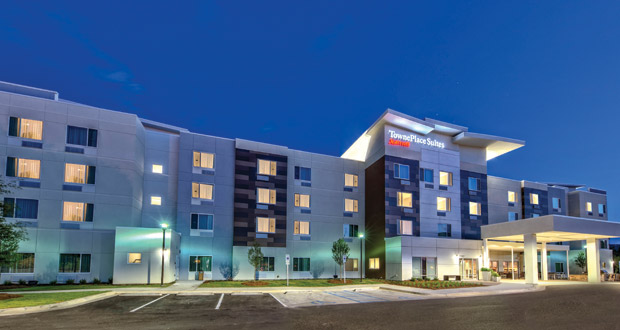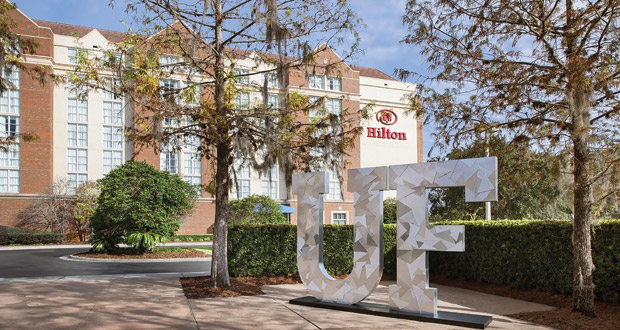No doubt about it, the revenue growth and expansion the industry enjoyed during the post-recession years 2010-2014 has slowed, a trend that reportedly is expected to continue through the end of the decade. Yet, as several hotel brokerage, management, and investment companies told LODGING, there’s still plenty of opportunity for those who understand the direction of the market, their own position, and their individual strengths.
Interviewees whose companies own, manage, and broker hotel properties—all in longstanding family businesses—suggest that smart investment during uncertain times means making safer bets based on what they already know or do. For Denihan Hospitality Group’s Patrick Denihan, who, along with his sister, Brooke Denihan Barrett, is co-CEO of the company his father Benjamin “Bud” Denihan founded over 50 years ago, that means sticking largely with what they specialize in: repositioning—not building—properties while simultaneously being careful not to disrupt the guest experience. Similarly, in saying, “We’ve had success by sticking to our knitting,” Mark Ricketts, president and COO of McNeill Hotels, which was co-founded by Phillip H. McNeill and himself, emphasizes that the company likes to remain in familiar territory with limited-service hotels, including the college market, in the southeast and southwest. McNeill and Ricketts are both second-generation hoteliers, each with more than 30 years of industry experience, including with the hospitality and realty management divisions of Goldman Sachs. And, Christopher Plasencia, vice president at The Plasencia Group, says his privately held firm is an especially staunch advocate of the college market, which they regard as “recession-resistant,” largely due to the factors he describes that make it such a consistent performer.

Weighing in from another perspective entirely is Jordan Ray, principal at Mission Capital Debt and Equity Finance, a New York City-based firm that arranges equity and mortgage financing for hotels and other real estate nationwide. (The firm also recently joined forces with UK-based Brotherton Real Estate to offer trans-Atlantic financing through an entity called Mission Brotherton.) He agrees that profitably riding the ups and downs of any market calls for the ability to switch gears when the winds change, something his company, which deals strictly with financing, has mechanisms in place for. However, he says, knowing when the winds will change is another matter; he believes real estate in general is essentially cyclical but rarely predictable. “The market changes constantly. In my experience, things don’t stop until they stop.”
What They’re Seeing
Ray’s comments notwithstanding, all agree that market factors now in play include oversupply in some areas of the country and sluggish revenue growth in general, but they are also seeing positive trends.
“We’ve enjoyed a huge up-cycle, and everyone keeps waiting for the bottom to fall out,” says Ricketts, who observes concern in the industry that the tides may be changing, especially in major markets such as Dallas, Nashville, New York, and Miami, which have been built to the point of oversupply in recent years. However, he is seeing steady growth ahead: “So far, during the first three months of this year, RevPAR has been better than expected—demand is still there, and encouraging job news is a welcome sign. We witnessed strong corporate demand in the first quarter and some solid leisure as well, so we’re still optimistic.”
Denihan expects the New York market in particular to be saddled with as much as 35 percent more inventory than just five years ago, and is grateful that the management team collectively decided to expand the company’s flagship, The James brand, beyond Manhattan and into core growth markets like Chicago and Washington, D.C., since buying out the rest of the family in 2006. Nevertheless, he says Denihan’s New York properties are holding their own, partly due to the company’s leading operations team and management expertise. “An additional 30 to 40 percent more supply in any market is a big hit, but occupancy has remained strong, and we’re seeing our ADR and RevPAR accelerate in a positive way,” Denihan states.

What Plasencia has noticed about the current environment is that, beyond investor demand for less risky investments, such as those in college markets, high-net-worth investors are choosing to enter the hospitality investment arena. This is possibly because—despite concerns sending many for cover—many still regard hotels as an attractive alternative to other investment options. “We’re seeing a lot of first-time hotel buyers and owners, both foreign and domestic, who have other holdings—even other holdings in real estate—viewing now as a great time to enter the market, believing they can get stronger risk-adjusted yield out of a hotel than an apartment building or even an investment in the stock market.”
Ray does not see signs that overall activity is abating in the U.S. and mentions opportunities he sees now. “Clients are still buying and building hotels, even in New York, where hotel values have normalized. We’re currently seeing an acquisition trend, and financing continues to be available.” Ray further sees opportunity in “places that don’t have room stock but should”—including the Pacific Northwest, Dallas-Fort Worth, and Los Angeles.
What They’re Doing
While those directly involved in the hotel business continue to do what they do best, regardless of market conditions, none have their heads in the sand. All made good use of those good years, and are confident of their ability to weather what’s ahead, come what may.
This is especially true of Denihan Hospitality Group, which owns and operates luxury and boutique/lifestyle hotels, including The James and Affinia Hotel Collection brands, as well as the independent boutique hotels The Benjamin and The Surrey in Manhattan. During the 10+ years since taking the helm of their family’s business—a period spanning a recession, recovery, and new players, approaches, and technology—the Denihan siblings have had the company venture into new markets, such as Miami and Los Angeles, and gained experience in new-build properties, financing, and management arrangements. They’ve also been working with REITs, private equity, and third-party managers, and gaining experience in new builds.
Denihan says it was the purchase of The James Hotel in Chicago that really changed their business model most dramatically. “With that purchase, we were joined by a team with significant expertise in development and operations, which brought us into a whole new world.”
But describing the secret weapon they can fall back on, Denihan says, “We’re a family business that has a lot of talent in the operations and management side, as well as tremendous knowledge and skill in the construction and, most of all, repositioning of assets. If I look back at the assets that my family and I have owned, only two were new builds—the rest were all repositionings.”
He says because expertise in this realm can be hard to find, it is a distinct competitive advantage. “While others back away from these deals, it’s easy for us to look at a standing asset and figure out how to reposition it and get the most value.” Perhaps even more coveted, he says, is their ability to operate a hotel during a renovation with very little impact on guests.
“We find that most of our lenders offer better terms when we can offer a flow of income—even when rooms are out of order.”
An added benefit, he says, is what can be learned by continuing hotel operations during the construction process. “It helps us tremendously with our labor costs and helps us fine-tune and learn more about a new asset during that time period.”
Denihan says this continues to be true in New York. “We know our partners benefit tremendously from our platform and expertise with the labor market here in N.Y. We know how to get things done expeditiously and at the right price due to our familiarity with both internal and external labor.”

Plasencia, who focuses on the acquisition, disposition, financing, and development of full-service hotels and resorts, says he generally looks for trends in what investors are targeting. “We try to focus on whatever variables specific investors earmark—and something we’ve noticed as a phenomenon over the last 12-18 months has been an emphasis on investing in college markets. This is something that is market-driven, and not necessarily something we are trying to shoehorn investors into.”
The most unique factor of the university market, he says, is a microeconomy that supports hotel demand very consistently. This, of course, makes it something of a safe haven during times that may become uncertain.
What’s the attraction? The obvious ones are the optics—youth, culture, sports, plus special events like homecoming and parents’ and graduation weekends. “College towns tend to be more vibrant and cultural than other markets. There’s often a strong sense of community pride, a special buzz that revolves around sports teams or whatever the school is known for—for example, football at Michigan, basketball at Duke, and the Hotel School at Cornell,” he says.
But it’s more than that, says Plasencia, who attended both Duke University and the University of Florida in Gainesville. “They just continue to grow. Whether times are good or bad, it seems enrollment continues to expand.” He notes, too, that graduation weekend is no longer an annual event. “These days, it seems many schools have graduations almost on a monthly basis, thanks to their year-round curriculums.”
He says college markets have other special advantages that make them recession-resistant and therefore a practical choice for development. “For one, they receive consistent investment from federal sources, including financial aid and research grants. They also benefit from consistent, if not growing, enrollment, and in bad job markets, they’re further boosted by recent graduates enrolling in postgraduate programs.”
Plasencia says assets in college settings have generally performed well over the recent cycle thanks to their market intangibles. In some cases, he observes, this has created an influx of new supply, though many times it is tempered by enormous competition for prime real estate among those seeking to develop student housing, retail, and hotels in an effort to cater to students, alumni, and parents. Still, says Plasencia, college towns continue to be an investment his company remains committed to for reasons detailed in the sidebar on page 45, “What’s So Special About the College Market.”
Ricketts, whose McNeill Hotel company owns and manages mainly select-service hotels and is an approved franchisee for both Marriott and Hilton, also likes working in the college market, and notes that demand in that segment “has continued to stay steady and increase over the past few years in those markets.”
He does, however, point out challenges involved in entering this extremely desirable market and that existing acquisition opportunities may conflict with his company’s bread-and-butter select-service segment. “There really isn’t a lot of real estate to be found. Some towns have a moratorium on hotel development—possibly because an increasing number of students prefer apartments to dorms—and in others, such as Ann Arbor, it’s hard to find land near campuses and virtually impossible getting through the hoops of a demanding entitlement process.”
He says when considering the properties that are available for purchase, they take into account their own niche. “We need to consider how an available property meets our own needs, what we do.” Ricketts believes it’s important to keep true to the path that has served the company well. “We’ve had success with limited-service—not 5-star—hotels. Because we have a specific focus, we’ve been able to go from zero hotels to 17 in less than three years, with a further three hotels in development.”

Reiterating his go-with-what-you-know philosophy, Ricketts says his company’s heritage —the partners’ fathers are available to offer free advice—informs many of the decisions they make, and says they prefer working in familiar territory. “The Midwest will be our next focus, but we prefer the southeast and southwest, where we’ve been successful in the past. Our knowledge of those markets is a huge advantage. Often, we look back on experiences with properties we’ve had, such as a Hampton or Courtyard, to see the changes that have been made and what did or did not perform well.”
Noting the oversupply that impacted larger markets such as Dallas, Nashville, Houston, N.Y., and Miami, Ricketts recognizes things may change. “We understand that supply will probably come to secondary markets as people start to find headwinds in the top 25 markets.” Regardless, Ricketts believes his company’s focus on secondary markets in the select-service realm with “power brands” like Marriott and Hilton will continue to make sense for his company.
What it All Comes Down To
Ray doesn’t ever try to predict what the market will do next. Not that he’s worried; because he is arranging financing for investments that are often presented to his company when they are identified and under contract, adapting to change is largely a matter of switching gears, not retreating to safer ground. “During upcycles we raise capital—JVequity, Mezz, and mortgages—but when and if things do end and there’s an asset purge, we’ll put greater focus on our distressed debt sale business.” What’s more, because the company now works internationally, it is not impacted as significantly by the regional factors to which hotel brokers, owners, and operators are vulnerable.
Yet while Ray’s involvement in the hotel industry differs from that of the other interviewees, a key take-away from him would likely benefit businesses of all kinds. “We’re always busy, because we have strategies for being profitable in good and bad times.”
Top photo: The Plasencia Group’s Hilton University of Florida Conference Center in Gainesville, Fla., is one of the company’s strong investments in college markets.











